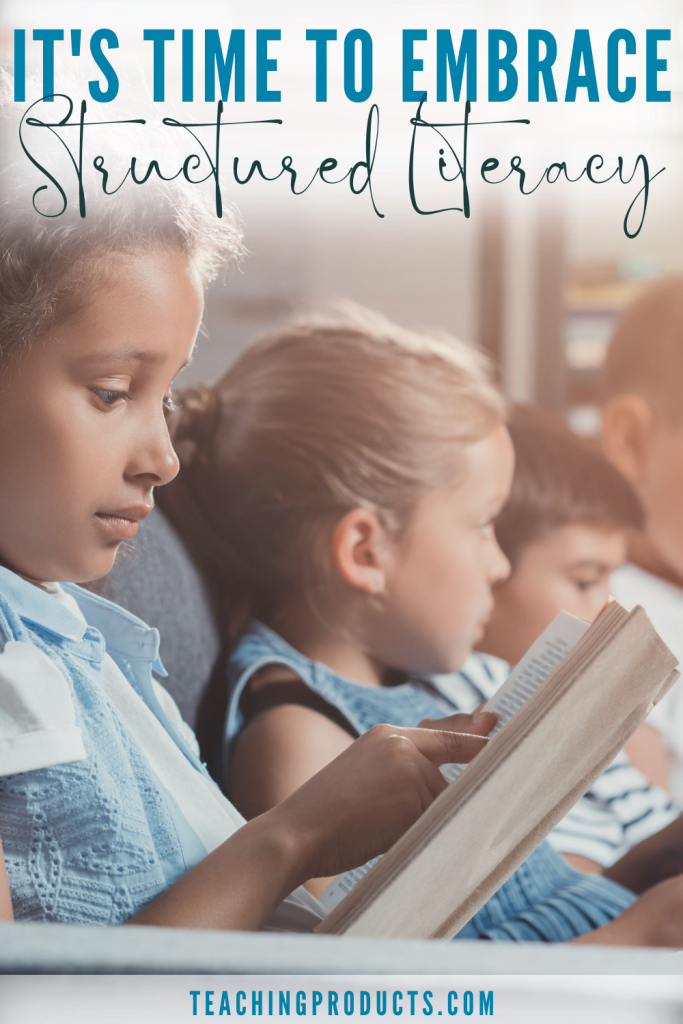There’s been a lot of debate lately about the best way to teach reading. Should we focus on balanced literacy, which includes both whole-language and phonics-based approaches? Or should we embrace structured literacy, which is based on the science of reading?
Structured literacy has a clear advantage when it comes to teaching kids how to read. Here’s why:
Structured literacy is based on the science of reading
The science of reading is a growing body of research that tells us how the brain learns to read. This research comes from a range or areas, including neurology, psychology, linguistics, education and more. And structured literacy is based on this research.
Focus on the skills that kids need to learn to read
Have you ever told parents to read with their child every day? I have! And we tell parents this because we’ve always been told that reading to children helps them learn to read. Balanced literacy often takes a “spray and pray” approach, where kids are exposed to a variety of reading material in the hopes that they’ll pick up the skills they need along the way. But structured literacy is focused on teaching the specific skills that kids need to learn to read. That means they’re more likely to actually learn those skills.
Structured literacy gives kids a solid foundation in reading
Structured literacy gives children a strong foundation in reading because it focuses on teaching the specific skills that kids need to learn to read. They’ll be able to build on that foundation as they continue to read and learn. This approach presents the information in a systemic and logical sequence. Children are taught specific sounds, they learn to write a representation of each sound, and they are exposed to the same sounds in decodable texts.
Based on science
The structured approach is based on the latest scientific research about how people learn to read. That means it’s an effective way to teach reading, and it’s also constantly evolving as new research comes out. It uses a speech first approach – identifying those very first skills that children develop and recognizing the associated neurological and linguistic skills.
Customizable to fit each child’s needs
Structured literacy can be customized to fit each child’s needs because it focuses on teaching specific skills. That means every child can get the individualized instruction they need to succeed in reading. When we consider learning disabilities such as dyslexia, a structured approach is the most effective because children are taught the code they need to become proficient readers.
Structured literacy is fun!
Learning to read can be enjoyable, and structured literacy approaches make it easy for both kids and adults to have fun while they’re learning. From games and activities to books and other resources, structured literacy makes reading enjoyable for everyone involved. Gone are the days where decodable texts were boring and meaningless with single words on each page. There are now heaps of commercially available decodable texts that are actually quite enjoyable to read. Here in Australia, my favorites are Little Learners Love Literacy and the Australian Decodable Readers. SPELD-SA also has some FREE downloadable decodable readers if your budget is tight.
The future of reading instruction
As more and more research comes out about the importance of structured literacy, it’s clear that this approach is the future of reading instruction. By using a structured literacy approach, we can ensure that all children have the opportunity to learn to read in a way that works best for them.
It’s the most effective way to teach reading
There’s no denying that structured literacy is the most effective way to teach reading. By using a structured approach, we can ensure that all children have the opportunity to learn to read in a way that works best for them. With this approach, we can help every child reach their full potential as a reader. It’s beneficial for students of all ages and abilities. It is an evidence-based practice that can help struggling readers become successful, as well as improve the reading skills of all students. If you are looking for a way to help your students become better readers, structured literacy may be the answer.




